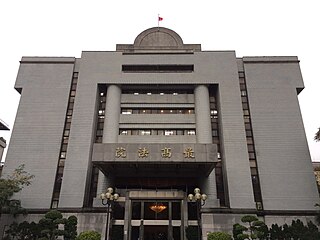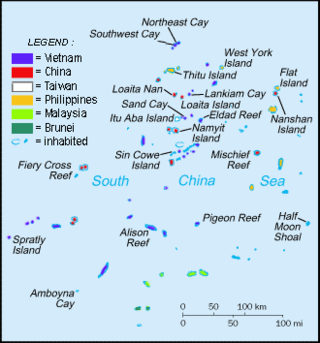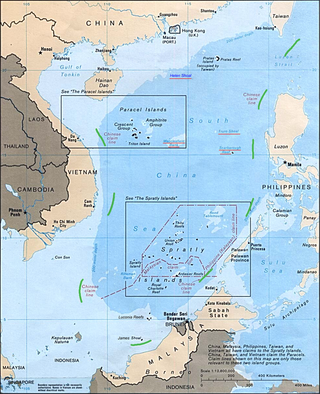
The International Court of Justice, also called the World Court, is the only international court that adjudicates general disputes between nations, and gives advisory opinions on international legal issues. It is one of the six organs of the United Nations (UN), and is located in The Hague, Netherlands.

The Judicial Committee of the Privy Council (JCPC) is the highest court of appeal for the Crown Dependencies, the British Overseas Territories, some Commonwealth countries and a few institutions in the United Kingdom. Established on 14 August 1833 to hear appeals formerly heard by the King-in-Council, the Privy Council formerly acted as the court of last resort for the entire British Empire, other than for the United Kingdom itself.

The United Nations Convention on the Law of the Sea (UNCLOS), also called the Law of the Sea Convention or the Law of the Sea Treaty, is an international agreement that establishes a legal framework for all marine and maritime activities. As of May 2023, 168 countries and the European Union are parties.

The South China Sea is a marginal sea of the Western Pacific Ocean. It is bounded in the north by South China, in the west by the Indochinese Peninsula, in the east by the islands of Taiwan and northwestern Philippines, and in the south by the Indonesian islands of Borneo, eastern Sumatra and the Bangka Belitung Islands, encompassing an area of around 3,500,000 km2 (1,400,000 sq mi). It communicates with the East China Sea via the Taiwan Strait, the Philippine Sea via the Luzon Strait, the Sulu Sea via the straits around Palawan, and the Java Sea via the Karimata and Bangka Straits. The Gulf of Thailand and the Gulf of Tonkin are part of the South China Sea.

In international law, extraterritoriality is the state of being exempted from the jurisdiction of local law, usually as the result of diplomatic negotiations.
Extraterritorial jurisdiction (ETJ) is the legal ability of a government to exercise authority beyond its normal boundaries.

The Judicial Yuan is the judicial branch of the government of Taiwan. It runs a Constitutional Court and oversees all systems of courts of Taiwan, including ordinary courts like the supreme court, high courts, district courts as well as special courts like administrative courts and disciplinary courts. By Taiwanese law, the Judicial Yuan holds the following powers:

Scarborough Shoal, also known as Bajo de Masinloc, Huangyan Island, Minzhu Jiao and Panatag Shoal, are two skerries (rocks) located between Macclesfield Bank to the west and Luzon to the east. Luzon is 220 kilometres (119 nmi) away and the nearest landmass. The atoll is a disputed territory claimed by the Republic of the Philippines through the 1734 Velarde map, while the People's Republic of China and the Republic of China (Taiwan) claim it through the disputed nine-dash line. The atoll's status is often discussed in conjunction with other territorial disputes in the South China Sea such as those involving the Spratly Islands, and the 2012 Scarborough Shoal standoff. It was administered by the Philippines as part of its Zambales province, until 2012, when a standoff was initiated by China through the use of warships against fishing boats, resulting in effective capture by the Chinese maritime forces.
Freedom of navigation (FON) is a principle of law of the sea that ships flying the flag of any sovereign state shall not suffer interference from other states, apart from the exceptions provided for in international law. In the realm of international law, it has been defined as “freedom of movement for vessels, freedom to enter ports and to make use of plant and docks, to load and unload goods and to transport goods and passengers". This right is now also codified as Article 87(1)a of the 1982 United Nations Convention on the Law of the Sea.

The Supreme Court of the Republic of China is the court of last resort in the Republic of China (Taiwan), except matters regarding interpretation of the Constitution and unifying the interpretation of laws and orders which are decided by the Constitutional Court of the Judicial Yuan.
The Philippines has claims on territories which include the Spratly Islands, portions of North Borneo, and the Scarborough Shoal.

The judicial branch, organized under the constitution and organic law, is one of five organs of state power elected by the National People's Congress (NPC), in the People's Republic of China. China does not have judicial independence or judicial review as the courts do not have authority beyond what is granted to them by the NPC under a system of unified power. The Chinese Communist Party's Central Political and Legal Affairs Commission maintains effective control over the court system and its personnel. Hong Kong and Macau have separate court systems in accordance with the "one country, two systems" doctrine.

The Spratly Islands dispute is an ongoing territorial dispute between Brunei, China, Malaysia, the Philippines, Taiwan, and Vietnam concerning "ownership" of the Spratly Islands, a group of islands and associated "maritime features" located in the South China Sea. The dispute is characterized by diplomatic stalemate and the employment of military pressure techniques in the advancement of national territorial claims. All except Brunei occupy some of the maritime features.

A maritime boundary is a conceptual division of Earth's water surface areas using physiographical or geopolitical criteria. As such, it usually bounds areas of exclusive national rights over mineral and biological resources, encompassing maritime features, limits and zones. Generally, a maritime boundary is delineated at a particular distance from a jurisdiction's coastline. Although in some countries the term maritime boundary represents borders of a maritime nation that are recognized by the United Nations Convention on the Law of the Sea, maritime borders usually serve to identify the edge of international waters.

The nine-dash line, also referred to as the eleven-dash line by Taiwan, is a set of line segments on various maps that accompanied the claims of the People's Republic of China and the Republic of China in the South China Sea. The contested area includes the Paracel Islands, the Spratly Islands, the Pratas Island and the Vereker Banks, the Macclesfield Bank, and the Scarborough Shoal. Certain places have undergone land reclamation by the PRC, ROC, and Vietnam. The People's Daily of the PRC uses the term Duànxùxiàn (断续线) or Nánhǎi Duànxùxiàn, while the ROC government uses the term Shíyīduàn xiàn.

Territorial disputes in the South China Sea involve conflicting island and maritime claims in the South China Sea by several sovereign states, namely the People's Republic of China (PRC), Taiwan, Brunei, Malaysia, the Philippines, and Vietnam. The disputes involve the islands, reefs, banks, and other features of the region, including the Spratly Islands, Paracel Islands, Scarborough Shoal, and various boundaries in the Gulf of Tonkin. The waters near the Indonesian Natuna Islands, which some regard as geographically part of the South China Sea, are disputed as well. Maritime disputes also extend beyond the South China Sea, as in the case of the Senkaku Islands and the Socotra Rock, which lie in the East China Sea.

West Philippine Sea is the official designation by the government of the Philippines to the parts of the South China Sea that are included in the country's exclusive economic zone. The term is also sometimes incorrectly used to refer to the entire South China Sea.

The South China Sea Arbitration was an arbitration case brought by the Republic of the Philippines against the People's Republic of China (PRC) under Annex VII of the United Nations Convention on the Law of the Sea concerning certain issues in the South China Sea, including the nine-dash line introduced by the mainland-based Republic of China since as early as 1947. A tribunal of arbitrators appointed the Permanent Court of Arbitration (PCA) as the registry for the proceedings.

The Maritime Militia, also called the Fishing Militia, is one of the three forces, next to the China Coast Guard (CCG) and the People's Liberation Army Navy (PLAN), used in maritime operations by the People’s Republic of China (PRC).
















